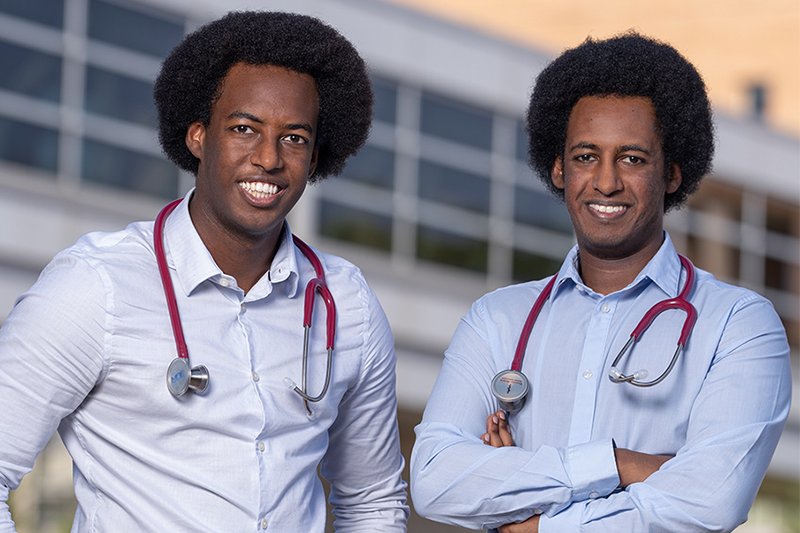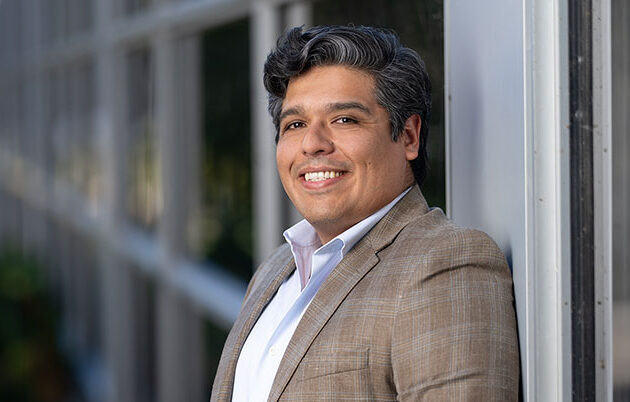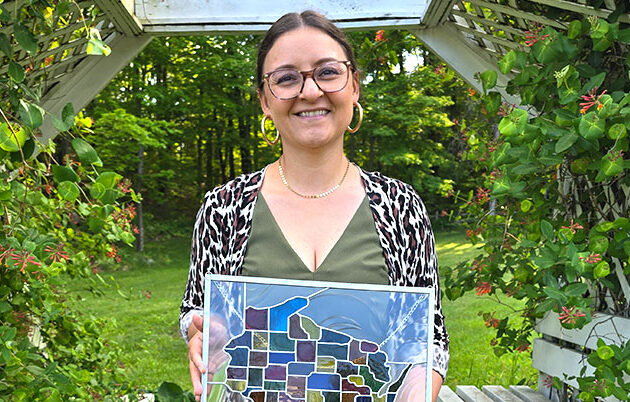Two Brothers, One Medical School
As third-year medical students at the University of Wisconsin School of Medicine and Public Health (SMPH), Barnabas T. “Barni” and Natnael T. “Nathaniel” Shiferaw are on parallel but distinctively different paths.
The brothers were born in Ethiopia and moved to the United States with their parents and two older siblings in 2002, when Nathaniel and Barni were three and two years old, respectively. The pair grew up in Wausau, Wisconsin, and attended UW–Madison. Nathaniel earned a degree in philosophy and a certificate in global health in 2021. Barni majored in biology, graduating the following year. Because Nathaniel took a gap year after earning his undergraduate degree, the two started medical school at the same time.
Their parents were nurses, and both Nathaniel and Barni say they have always felt drawn to medicine. They had independently considered other medical schools, but SMPH’s quality of education and focus on public health — coupled with the opportunity to build upon the strong foundation they had developed at UW–Madison — made SMPH feel like a natural progression.

“I could not see my medical school experience being much smoother than it has been here,” Barni said. “The student body and faculty have been super supportive, and I have a really good group of friends. I can reach out to any faculty member, and they are happy to help or point me in the right direction, and the residents and attendings challenge and push me in a good way to grow. I just love it, and I am excited to see where my career goes.”
The brothers have been roommates since they were undergraduates and appreciate having a built-in support system and study partner. While they may not see each other for days at home due to their varied schedules, the chance to randomly run into one another at the hospital during clinical rotations is a bright spot on a busy day. The only place they compete is on a pickleball court.
They also have identified their individual paths as physicians. Barni finds anesthesiology appealing, while Nathaniel is interested in internal medicine. The two headed to Gundersen Health System in La Crosse, Wisconsin, in early October 2024 to finish their last three months of clinical rotations.
Choosing Pain Management
When he arrived at medical school, Barni had an inkling of what he wanted to do as a physician. Shadowing an anesthesiologist in Wausau as an undergraduate had sparked his interest in that specialty early on. As the youngest person accepted into SMPH’s Rural and Urban Scholars in Community Health Program (RUSCH) — a pre‑medical pathway program — Barni gained experience conducting research after his first year at UW–Madison. He also learned skills for doing motivational interviews and working with patients as a health coach at Wingra Clinic, a federally qualified health center in Madison.
Barni’s experiences during medical school clinical rotations led him toward the subspecialty of pain management.
“I get really excited about the pharmacology and physiology of anesthesiology, as well as the challenge of critically assessing a patient’s condition and making decisions in real-time in the operating room,” Barni said. “During my general surgery rotation, I realized how much I like to be able to see patients get better, and through pain management, you can really change your patient’s quality of life.”
A ten-week summer research fellowship at the Mayo Clinic solidified Barni’s passion for research. He is inspired by his work with UW Health pain specialist and clinical investigator Alaa Abd-Elsayed, MD, MPH, and where this experience may lead him.
“I really like the work I’ve been doing as we think through a set of data, determine how we want to analyze it, and come to understand what it means and how it compares to the literature. This experience has set me up for success down the road,” he said.
He added that his work during his family medicine rotation with the Nehemiah Center for Urban Leadership Development’s re-entry program — which supports formerly incarcerated people — has caused him to think about ways he can give back to the community in his career.
“It taught me the importance of understanding where people are at, as we see the common perceptions, thoughts, and troubles people have with the medical system,” he said.
Pursuing Internal Medicine
A family friend who is an internal medicine physician inspired Nathaniel to consider pursuing the path to that specialty.
“He embodied my understanding of what a great physician is. He is articulate, intelligent and caring. He made a really big impact on me as I was growing up,” Nathaniel recalls.
During his junior year of college, Nathaniel fell in love with philosophy, something that dovetails nicely with his interest in internal medicine. During his undergraduate years, he also worked for the Center for Ethics and Education, where he interviewed guests and edited a podcast. Early in his time at SMPH, he served as the chair of the Medical Student Ethics Committee, and today, he is pursuing the school’s Path of Distinction in Bioethics.
“I’ve learned that, in medicine, there are many situations for which there may not be a right or clear textbook answer,” Nathaniel reflected. “Using similar information, different physicians could reasonably make different choices. And while the outcome may be similar, when you consider scarce resources and distributive justice, the decisions you make and the reasons for them may be super important.”
Nathaniel is fascinated by how diseases present in people, and he appreciates the diverse skill set and broad knowledge base needed for internal medicine. Through clinical rotations, he also has discovered how much he loves listening to people’s stories.
“Hearing them talk about their life experiences, in addition to what brought them in for medical care, is always rewarding,” he said.
Visiting Ethiopia with his family a few years ago left a deep impression.
“I was just three years old when we moved, so I do not have any memory of our time there. It was a big thing to see our family,” he recalled. “It was really interesting to go back there in my 20s and have a more mature and better understanding of what life is like there versus in the United States.”
Nathaniel also has a strong interest in public health and plans to take global health-related electives. He hopes to use his medical skills in some capacity in Ethiopia through an organization such as Doctors Without Borders.
Family Pride
After Barni and Nathaniel had graduated from UW–Madison, their parents moved to Washington to live closer to their extended family and to connect with a bigger Ethiopian community than the one in Wisconsin. Before that move, the family experienced a special point of pride as they watched Barni deliver the UW–Madison commencement speech to 47,000 Badger graduates. Extended family members traveled from Washington to attend in person, and relatives in Ethiopia watched the event online.
“Barni speaking at graduation and both of us attending medical school is the ultimate fulfillment of our parents’ hopes and dreams when they immigrated from Ethiopia. And for our family back home to see what it looks like to succeed in America was a whole other thing,” Nathaniel reflected. “I feel happy that we have been able to make our parents proud.”

